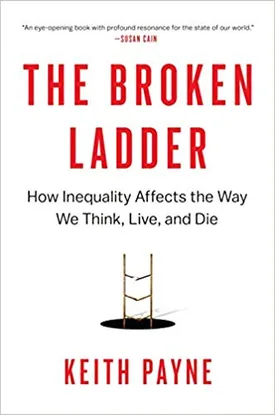The Broken Ladder: How Inequality Affects the Way We Think, Live, and Die by Keith Payne
In 2015, psychologist Keith Payne wrote “The Broken Ladder: How Inequality Affects the Way We Think, Live and Die” as a way of illustrating how income inequality can drastically impact people’s lives. In this compelling and thought-provoking book, Dr. Payne explains how income inequality affects the way people think, live, and even die, and how, if left unchecked, it can cause significant psychological and even physical harm.
Through a blend of scientific research, anecdotal evidence, and interview-style storytelling, Dr. Payne paints a vivid picture of how the negative aspects of income inequality affect people on a daily basis. He believes that the divide between the “haves” and “have nots” is largely responsible for creating unhealthy psychological mindsets, particularly in lower economic classes, that can be incredibly detrimental.
Dr. Payne’s research reveals that inequality can lead to significantly lower levels of life satisfaction and happiness. This is because low-income individuals often have fewer opportunities and resources than their higher-income peers, creating a sense of powerlessness that erodes self-esteem and hinders potential success. This inequality can also cause feelings of helplessness and allow negative feelings like resentment and bitterness to fester.
Additionally, by living among so much struggling, Dr. Payne argues that the poor can become resigned to the idea that their situation can’t be changed, further perpetuating their current state of destitution.
In addition to psychological effects of inequality, Dr. Payne also dives into the physical health complications that arise due to low income. He cites an abundance of research showing that impoverished individuals are more likely to suffer from a variety of physical ailments due to poor nutrition, lack of access to healthcare, and unsafe living conditions. Studies also show that life expectancy is much lower for people in poverty, with some lower economic classes only living five to ten years less than those with higher incomes.
Dr. Payne also discusses the role of societal judgement in fostering inequality. Research shows that people with higher incomes are judged with greater leniency than those with lower incomes, while those with lower incomes are judged with harsher standards. This allows prejudice to further widen the gaps between social classes, creating the vicious cycle of inequality that plagues society.
Finally, Dr. Payne discusses the importance of fighting for greater equality. He believes that the health of society depends on breaking down the unequal ladder of opportunity and providing more equitable access to resources. By endorsing education, economic policies, and other initiatives that aim to create more equal playing fields, individuals of all economic classes can have a better chance at living a healthy and prosperous life.
Overall, “The Broken Ladder” is an essential read for anyone interested in learning more about the far-reaching implications of income inequality and how to work towards creating a more equitable society for all. With unique insights, powerful stories, and timely tips for creating change, this book is sure to leave a lasting impression on its readers.

